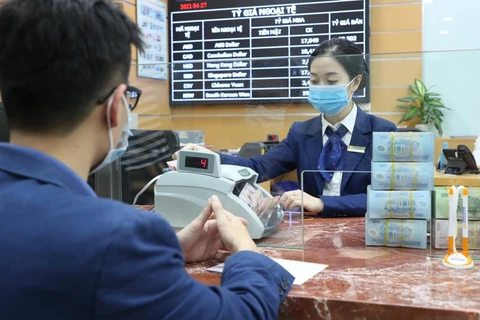Hanoi (VNA) – Prime Minister Pham Minh Chinh on January 8 asked the banking sector to maintain its role as the “blood of life” for the national economy, while addressing a conference in Hanoi on January 8.
The conference, held by State Bank of Vietnam (SBV), was connected with the bank’s branches in the 63 cities and provinces nationwide, with the attendance of representatives from different ministries and agencies.
The government leader expressed his delight at the fact that despite a host of difficulties, bank deposits still reached 13.5 quadrillion VND (533.99 billion USD) in 2023, which, he said, demonstrates people’s improved living standards as well as their confidence in the Party, the State, and the banking sector.
He spoke highly of the significant contributions by the central bank and the banking sector in general to national achievements last year, and lauded great efforts and strong resolve displayed by the sector in the year.
The PM also noted some limitations regarding policies, elaborating that some credit mechanisms and policies remain poorly flexible and matching the situation. Besides, he said, ministries and agencies need to tighten their coordination, and inspections and supervisions should be improved.
Highlighting the importance of the year 2024 to the implementation of the 2021-2025 socio-economic development plan, Chinh urged the SBV and the entire sector to join hands with ministries, agencies and localities to fulfill the tasks set for this year.
The banking sector must help the Government out of a passive position in the rolling out of monetary policies, ensure no corruption, help businesses and people access capital, and serve the rapid, inclusive, sustainable development, he continued.
The conference, held by State Bank of Vietnam (SBV), was connected with the bank’s branches in the 63 cities and provinces nationwide, with the attendance of representatives from different ministries and agencies.
The government leader expressed his delight at the fact that despite a host of difficulties, bank deposits still reached 13.5 quadrillion VND (533.99 billion USD) in 2023, which, he said, demonstrates people’s improved living standards as well as their confidence in the Party, the State, and the banking sector.
He spoke highly of the significant contributions by the central bank and the banking sector in general to national achievements last year, and lauded great efforts and strong resolve displayed by the sector in the year.
The PM also noted some limitations regarding policies, elaborating that some credit mechanisms and policies remain poorly flexible and matching the situation. Besides, he said, ministries and agencies need to tighten their coordination, and inspections and supervisions should be improved.
Highlighting the importance of the year 2024 to the implementation of the 2021-2025 socio-economic development plan, Chinh urged the SBV and the entire sector to join hands with ministries, agencies and localities to fulfill the tasks set for this year.
The banking sector must help the Government out of a passive position in the rolling out of monetary policies, ensure no corruption, help businesses and people access capital, and serve the rapid, inclusive, sustainable development, he continued.
He also asked the sector to further keep a close watch on domestic and international situation to take timely policy response, and combine monetary policies with fiscal ones harmoniously, with priorities to spurring economic growth in tandem with stabilising the macro economy, capping inflation at about 4-4.5%, ensuring major economic balances, stabilising monetary and foreign exchange markets, and ensuring the safe operation of credit institutions.
Credit loans should target priority business areas and major growth engines, the leader said, stressing the need to closely control those in the areas with potential risks, and that loans should not focus on only some big firms and clients.
He suggested the sector offer more credit incentives, take more measures to cut loan interest rates and unnecessary fees, simplify lending procedures and conditions, and step up the application of information-technology and digital transformation.
The legal framework should be reviewed to facilitate the safe, healthy, smooth and sustainable operation of the sector, he said, touching upon human resources development in the sector.
According to a report presented at the conference, the banking sector has contributed to stabilising the macro economy and controlling inflation at around 3.2-3.4% in 2023.
The central bank reduced operating interest rates four times by 0.5 - 2% percentage points in the context that world interest rates continued to rise and remained at high levels.
The bank has set a credit growth target of 15% this year, up 1 percentage point from last year’s target./.
Credit loans should target priority business areas and major growth engines, the leader said, stressing the need to closely control those in the areas with potential risks, and that loans should not focus on only some big firms and clients.
He suggested the sector offer more credit incentives, take more measures to cut loan interest rates and unnecessary fees, simplify lending procedures and conditions, and step up the application of information-technology and digital transformation.
The legal framework should be reviewed to facilitate the safe, healthy, smooth and sustainable operation of the sector, he said, touching upon human resources development in the sector.
According to a report presented at the conference, the banking sector has contributed to stabilising the macro economy and controlling inflation at around 3.2-3.4% in 2023.
The central bank reduced operating interest rates four times by 0.5 - 2% percentage points in the context that world interest rates continued to rise and remained at high levels.
The bank has set a credit growth target of 15% this year, up 1 percentage point from last year’s target./.
VNA
























